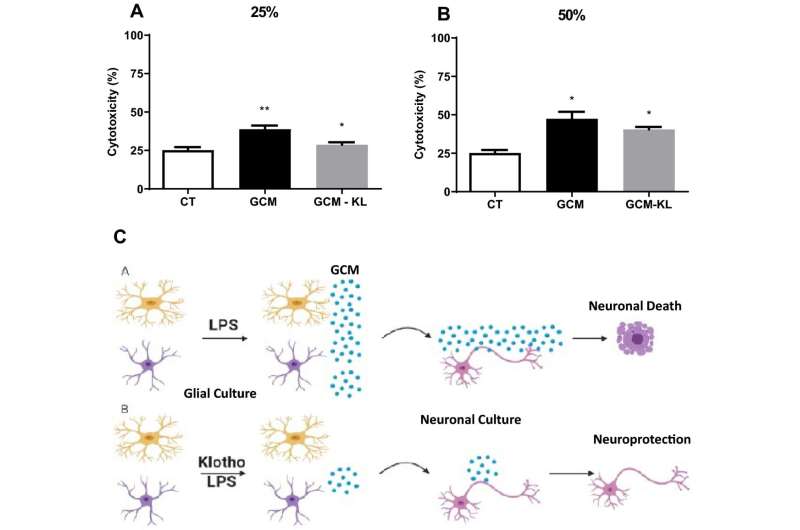
The process of cellular aging is multifactorial, and its investigation involves several knowledge areas. Finding ways to protect cells against damage is a key focus.
A group of researchers recently achieved noteworthy progress in this regard, as evidenced by an article published in Scientific Reports. According to the authors, in their study, the protein klotho protected glial cells against inflammation and death. Glia are non-neuronal cells of the brain and nervous system. There are several subtypes of glial cells, including astrocytes, oligodendrocytes and microglia.
The study involved in vitro experiments using a lipopolysaccharide (LPS) to induce inflammation in cultured glial cells. Lipopolysaccharides are components of Gram-negative bacteria cell walls that can cause an acute inflammatory response by triggering the release of pro-inflammatory cytokines in various cell types, potentially leading to cell death.
The researchers set out to see whether pre-treatment with klotho could protect glial cells against the surge in levels of pro-inflammatory mediators after the administration of LPS. The results showed for the first time in cultured neural cells that klotho can indeed have anti-inflammatory and neuroprotective effects, the article concludes, adding that klotho not only acts on the metabolic coupling between neurons and astrocytes but is also an important player in modulating glia neuroinflammation.
Previous research by the group demonstrated klotho’s involvement in the action of astrocytes, glial cells that supply nutrients to neurons, among other functions. The study was part of a thematic project on aging and neuroprotection, for which the senior investigator is Elisa Mitiko Kawamoto, a professor at the University of São Paulo’s Biomedical Sciences Institute (ICB-USP) in Brazil and penultimate author of the article.
Promising studies
Discovered in 1997, klotho is an anti-aging protein that circulates in the blood and brain throughout life but increases sharply between birth and adulthood, declining thereafter. The aging process is accompanied by low-grade chronic inflammation (“inflammaging”), which when dysregulated in the brain is associated with cognitive deficits and neurodegenerative diseases. As already noted, studies have shown that klotho can protect the central nervous system against neuroinflammation.
“Throughout my career, I’ve been interested in studying the molecular basis of neurodegenerative diseases, trying to understand their link with aging and why some people are able to remain healthy as they grow old,” said Cristoforo Scavone, last author of the article. Scavone is a professor of pharmacology at ICB-USP and principal investigator for the Thematic Project.
“In a previous study of chronic kidney disease associated with neuroinflammation, we found that klotho levels were diminished and that this correlated with the appearance of cognitive deficits.”
The protective and anti-inflammatory action of this protein had already been observed in the renal, vascular and pulmonary systems, but had not been studied extensively in cases of neuroinflammation, the focus of the research described in the article. “Our study has now produced strong evidence that klotho also has a neuroprotective effect. Pre-treatment with klotho reduced the secretion of pro-inflammatory cytokines and reversed the increase in secretion induced by inflammation,” Scavone said.
Neuroinflammation is an intrinsic part of the aging process. Neurodegenerative disease and damage to the central nervous system are known to act on astrocytes and other glial cells. Depending on the nature of their activation, this process may lead to the production of pro- or anti-inflammatory mediators and have beneficial or harmful effects on neurons. Mapping of these mechanisms is therefore important to the development of therapeutic possibilities.
Despite the good results, the authors warn that it is unclear whether klotho is the only mediator involved in the observed neuroprotective effect, concluding nonetheless that klotho’s therapeutic potential is evidenced in pathological processes that have a neuroinflammatory component.
More information:
Vinicius Wanatable Nakao et al, Neuroprotective action of α-Klotho against LPS-activated glia conditioned medium in primary neuronal culture, Scientific Reports (2022). DOI: 10.1038/s41598-022-21132-4
Journal information:
Scientific Reports
Source: Read Full Article